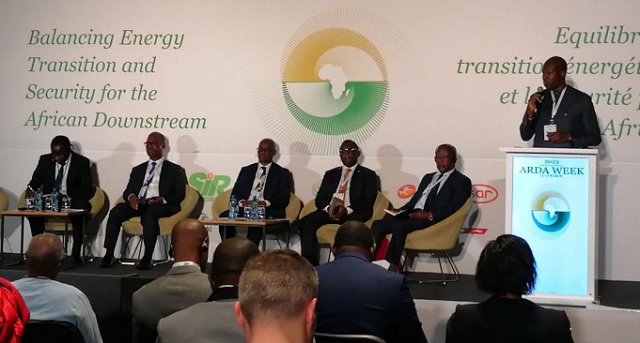
Lack of expertise, technology and industry know-how is challenge for Uganda, says Kyaruhanga
Kampala, Uganda | THE INDEPENDENT | Increasing investments to boost Africa’s refinery capacity while reducing the carbon footprint of the downstream and midstream sectors is a priority for the continent to achieve energy security and environmental sustainability.
In this regard, the African Energy Chamber (AEC), as the voice of the African energy sector, has joined stakeholders across the African downstream and midstream sector at the 2023 edition of the African Refiners & Distributors Association (ARDA Week) to discuss best practices for Africa to attract investments to boost refinery capacity for energy security.
In a panel discussion held during ARDA Week 2023 titled, ‘Spotlight on African Downstream Projects – Highlighting Refinery Investments for Energy Security’ and moderated by David Sineka, Retired Downstream Industry Expert, representatives from Africa’s top refiners explored the continent’s refinery projects and market trends while highlighting solutions to sector challenges.
Speakers included Daouda Kebe, Technical Director, SAR, Senegal; Joaquim Kiteculo, Head of Sonangol’s Business Unit, Refining and Petrochemicals (Sonaref), Sonangol; Raphael Souanga, Director of Development and Energy Transition SIR; Christopher Kyaruhanga, Transport Officer, UNOC; and NNPC, Executive Vice President Downstream, Eng. Adeyemi Adetunji.
According to Eng. Adetunji, Africa is a growth market with up to $1.5 trillion in investment required across the continent’s refinery sector, of which $15.7 billion will be directed towards ensuring existing infrastructure comply with new regulations.
Adetunji said, “New refinery investments need to look at optimising Africa’s entire supply chain and logistics to maximize industry operations. African pipelines need to connect, refinery products to be consolidated, and laws, tariffs and policies harmonised to see the free flow of petroleum molecules for Africa to achieve energy security.”
He emphasised the need for the continent to develop an African Energy Transition Strategy and private and public sector institutions and stakeholders across the entire oil and gas value chain to support the African Energy Transition Bank for the continent to guarantee the availability of investments to accelerate oil and gas infrastructure projects and achieve energy independence and affordability. “Today, Nigeria, for instance, despite being one of the world’s largest energy producers, imports every drop of its petroleum needs because all of our refineries are not operational. We hope the three projects aiming to renew our refinery capacity will go a long way in strengthening energy sector stability on the back of exploitation of local resources,” he said.
Commenting on opportunities for African refiners across the global energy market, Kebe, stated that, “Africa accounts for 10% of the world supply and with Europe increasing its interest, an opportunity has risen for the continent to attract more investments and to boost the monetisation of refined products.”
He stated that new projects being deployed in North Africa and Angola as well as modernisation initiatives in Angola, Senegal and the Ivory Coast not only present a chance for Africa to attract new investors but to expand refinery capacity to address local energy needs and to reduce emissions from the sector.
To back Kebe’s point, Kiteculo gave an update on the company’s projects including the Luanda Refinery Expansion, the Cabinda and Soyo Development and the Lobito initiative. He stated that the firm is implementing these projects as part of the Angolan government’s “plan to become self-sufficient.”
“These projects will enable us to provide value to stakeholders, power consumers, reduce emissions while shaping regional energy security and economic growth. For Luanda, we finished the construction of new platform units to increase daily production to 1,200 metric tons per day. We are already delivering 1,200 tons of gasoline to the domestic market while ensuring all our projects reduce carbon emissions,” he said.
Expanding on the role of African refinery projects in helping to meet local energy needs, Souanga highlighted how his firm has helped ensure that the Ivory Coast is able to meet 70% of its oil and gas needs leveraging local resources. While the Ivorian company is expanding its refinery capacity, it is also boosting the refinery’s energy efficiency while reducing the facility’s sulphur and benzine capacity in petroleum products.
“We aim to reduce benzine capacity to less than 1% of petroleum and we are commissioning the investment by 2028 as part of efforts to meet specifications introduced by ECOWAS. We are also setting up storage facilities, in partnership with the national oil company, since the existing ones were installed in 1982, and we are replacing heavy fuels with natural gas and looking at new forms of energies such as hydrogen and biofuels for mobility. We want to grow in that direction where we diversify the energy mix for security.”
Kyaruhanga reiterated the discussion by urging increased cooperation by African governments and downstream and midstream stakeholders to address the high-intensity upfront capital required for infrastructure projects, environmental concerns, human capital needs, logistics challenges and regulatory barriers disrupting industry expansion.
“One of our greatest challenges is the lack expertise, technology and industry know-how in Uganda. We are an emerging market. Our way forward is to accelerate partnerships with regional and global experienced markets while pushing for the decarbonisation, digitalization and expansion of infrastructure,” he said.
In this regard, AEC’s African Energy Week (AEW) conference and exhibition, Africa’s premier event for the energy sector, scheduled to take place on 16-20 October in Cape Town, will unite Africa’s downstream stakeholders and policymakers with global partners and investors to discuss and optimise opportunities across the sector for the continent to drive energy security and make energy poverty history by 2030.
 The Independent Uganda: You get the Truth we Pay the Price
The Independent Uganda: You get the Truth we Pay the Price


